- Home
- Kris Saknussemm
Sea Monkeys Page 5
Sea Monkeys Read online
Page 5
Seeing my sister’s alarm at having her dream fulfilled, but worrying that she might wet her pants with anxiety on her first real ride, he took the pillowcase off one of the pillows we’d been sitting on the lawn with, and put it over her head. I think the people running the pony ride were rather surprised by this move—and I’m fairly certain several other parents were—to see this little girl wearing a white hood led around the ring on a pony. “Mommy, am I going to have wear one of those?” a girl behind me asked.
I see my sister parading around the circle of dust, looking like a kidnap victim or a Klan child undergoing some initiation rite. My mother was scandalized (but that was easily done). Two circles around, and the hood came off. Dad’s methods were unorthodox, but they worked.
After that success, for so it was counted, the next step was a true ride out in some fields and on a real trail. The “ranch” was out in Martinez, which is the seat of Contra Costa County (where I would later serve my only jury duty assignment, an interesting murder case that finally hinged on a photograph of a driveway where the outline of a car appeared, proving that it had been parked there during the rainstorm when the crime was committed). It’s also the birthplace of Joltin’ Joe DiMaggio and home to a massive Shell Oil refinery and tank farm that gives the live oak California ranchero air a distinct tinge of industrial grit.
But the pony farm my father located was there, and so off we went one Saturday. Everything seemed fine at the start. My sister was calm (and no doubt glad not to have to wear the pillowcase). The pony was a fat thing named Suzie and seemed smaller to me than most of the merry-go-round animals. I figured if I could ride a big crazy-looking chicken, my older sister could ride a half-pint horse. What could go wrong?
Well, that’s the problem when things go wrong—it becomes very hard later to say where the drama started. Was it Dad’s lack of attention to the security of the saddle when the woman with the big bazooms came out to water some of the other ponies? Was it her husband with the terrible stutter that put us all off? Was it the mix of gold grass and black oak pollen combined with the harsh waft of oil smoke and plastics being made? The fact that my mother had wrapped our crumbed chicken picnic in cellophane and not foil, which then peeled off the skin and meat, could’ve been a factor too. Maybe everything counts when an emergency transpires. Maybe accidents don’t just happen, but are delicately if secretly orchestrated.
What occurred in this case was something my sister would’ve been better off wearing her hood to have experienced. The pony got loose and shot forward at full gallop. That may sound funny, and the whole idea of ponies is indeed a bit foolish—but they’re still powerful creatures, and this little tubby thing got up to speed in a way that stunned us all. My sister especially.
We watched her gallop off, just like in a movie. At first, I admit, I thought it was funny. There was an element of someone’s hobby getting away from them—of life, even at pony size, being more than they bargained for. But there was an acute sense of our family running away from itself too. The shrill cry of my mother blaming my father, when it seemed to me that she was every bit as much at fault. The whole horse passion was really hers. And what good did it do to yell at him, anyway, when the problem was two hundred yards away and escaping? Without understanding it, I learned a vital lesson that afternoon. The first person to assign blame is the most likely to be at fault. Think about that when stuff happens. I’ve found it to be a very sound rule. “I thought your father had it all under control” are words that might ring across the ages and at least two of the major religions.
My father, for all his shortcomings, had a theological position that can be summarized as this: don’t lose faith even when the blood starts to flow, and in this world, God’s work must truly be our own. He leapt into our old Rambler and bounced across the fields around the back. Meanwhile, my sister had slipped from the saddle and appeared to be almost dragged along the ground, her head seeming to bounce even more than the car.
Dad returned about fifteen minutes later, leading the pony, with my sister back in the saddle, her face streaked red with tears and fear—and blood. He held something in his hand with an uncomfortable level of care.
Not two minutes later we were in the stuttering rancher’s car and headed to the hospital. My sister was in a state of shock, holding the left side of her head. I wanted to hold the ear, which was wrapped in some of the cellophane left over from our picnic.
You think we might’ve learned from that episode, but not us. That was just the beginning.
I glanced at the ear in my mother’s lap and noticed there was some chicken skin on the side of the transparent wrapping. It made me think of the mad rainbow-colored rooster I’d ride on at Tilden Park. We were all on a carousel, without even knowing it.
“It’s only a piece of the ear,” my father said to the rearview mirror. (He’d later do that even when the backseat was empty, old habit.) “It’s going to be all right. They can do wonders now. Just some stitches.”
“If I had a pony of my own, this would never have happened,” my sister choked, in a brilliant seize-the-moment ploy. Dad would’ve handed her the car keys just then—anything to duck Mom’s wrath. I, meanwhile, was wondering what an ear would taste like—figuring it would probably be a step up from my mother’s chicken. We were all on the same carousel, lost in the same stampede.
“It’s going to be all right,” Dad repeated, and I knew that he’d say that at least five more times before we got home again.
SCHOOL FOR THE DEAD
There comes a morning when you’re forced to realize reality is more than a triceratops you can hold in your hand. Not only must you go to the bathroom in a public place on your own—but you must go to school.
School was a mysterious thing to me, because my mother was a teacher, but way across town. In order to get there, we had to drive by the large School for the Deaf, which was the subject of a running joke in our family, in that I at first thought I’d heard School for the Dead, and I didn’t think it was fair that dead children still had to go to school. This provoked great amusement among my family, which I didn’t take kindly to at all.
My academic career got off to a rocky start. Thinking she was doing the right thing, my mother took me along to nursery school a year early, just to give me a taste of what lay ahead so as to ease the shock when I finally really did have to go. The teacher was an older woman who was more than a bit deaf herself (which is probably how she put up with the rambunctious kids—or maybe how she’d lost her hearing). She misunderstood, assuming I was merely a late entrant and shooed my mother away, leaving me stranded amid the squalling, jabbering riot—for the first naked time.
There are only a few trials in life to compare with that initial collision with the outside world. For me it was traumatic in the extreme. The apple juice and graham crackers helped considerably, as did gluing down a pelican made of peanut shells. I made it through, but I returned home to my grandmother Gaja with a sense of relief verging on the religious. I’d been given a reprieve. Another year of home and the private world I knew and cherished. Still, I’d seen the future and I realized it wasn’t as overwhelming as I’d been afraid of.
In the intervening months, my perspective naturally changed further. What had previously been a nurturing and protective shell began to seem more and more restrictive. I came to feud more with my mother and even with Gaja. I bristled at the little-boy treatment. For the first time I started to give shape to the notion that I was being given two brutally opposed directives—one, to act very grown-up around grown-ups and, two, to never grow up, at least not in relation to other children my age. The first seeds of rebellion had been sowed. I became aware that my mother’s baby talk, which I’d formerly either enjoyed and participated in or failed to notice, now very much annoyed me. I took a stand and formally stopped calling her Mommy. The adoption of “Mom” seemed like a big gesture at the time, and wasn’t lost on her.
The other thing that changed me is that
I technically was the one to find our neighbor Mr. Crawford dead in his garage (carbon monoxide poisoning). It happened during a game of hide-and-seek with my sister and the Gage kids next door, and it didn’t really freak me out as much as it might seem. Not in the moment anyway. That’s the thing about being a kid—or me as a kid—I could worry about our cleaning lady Grace, this sort of cunning, severe Japanese woman, turning into a giant slimy brown fish when you weren’t looking—and then quickly changing back when you did—but dead Mr. Crawford only alerted me in an official way of something I should tell my sister about. I didn’t quite understand what I’d glimpsed through the dirty window of the garage, except that it wasn’t right . . . the car running . . . Mr. Crawford slumped over. His wife had died of lung cancer a month or so before. She’d been a very heavy smoker—I remember her once blowing smoke at me through their screen door (that was creepy). They were a childless couple in their late fifties . . . liked working on jigsaw puzzles together.
By the time I did have to go to nursery school, I was ready. There was a kid in my class who looked like Popeye, only he was black, and one who looked like Ernest Borgnine, and Tiger who wore only brown clothes—and a tall boy named Heinz who had accidentally been shot by his brother with a .22 and was always showing everyone the scar. Terry Sutcliffe, who wore a Beany and Cecil cap, poked me in the forehead with a pencil and left a blue mark that would stay there forever. We did the exercises with Jack LaLanne, who always wore weird stretch pants, and I hated Captain Kangaroo because I thought Mr. Greenjeans and Mr. Moose were dumb. One week I was ball monitor at recess and my hands smelled like rubber dodge balls. Adam and I wondered about the abandoned missile base in the hills and teased Eleanor Peacock, whose teeth were all rotten from sucking Fizzies. Becky Coyle, the jeweler’s daughter, always dressed up like Little Bo Peep, while I always dressed up like a cowboy. Sometimes she came over to our house and liked to have me watch her when she sat on the toilet. Eric had a crush on Patricia, who was the first girl I ever liked too. The little buggy things that floated in your eyes when you looked up into the sky were space snakes—and if you turned your head upside down you could see Upside Down World, where you had to step over doorways and where chandeliers grew upwards like trees.
Generally speaking, nursery school and kindergarten were pleasant experiences. I had a friend named Anthony, who I collected military badges with. We slid on wax paper down the cement slide at Codornices Park on Euclid Avenue, next to the Berkeley Rose Garden. As long as I could have my sofa pillow fights when I got home (and some time to look at my penis) I was OK.
But come first grade, things of course started getting more serious—in all ways. I stopped wearing my cowboy outfit, for starters. Then there was walking to school—which I did with my sister and two of the Gage kids. It was kind of exciting in the morning, and for the most part, my unexplained fears were under control. There was always a chance of crossing paths with FBI agents, the Abominable Snowman or the Scarlet Pimpernel (although I developed a curious terror of people wearing foam neck braces). There were the bells of fuchsia blossoms to burst and pyracantha berries to have fights with.
The Hilltop School was actually on a hilltop and had a good view east and west—with Indian paintbrush and California poppies all around. I liked gazing out toward the bay or over the hills—but to get to it from our house you had to make your way up through an older derelict school with boarded-up windows and peeling hallways. This didn’t worry me in the mornings, but coming back home in the afternoon, I did worry. A lot. I could feel the presence of invisible children—I heard their voices. It was a haunted sense of the Other World that I had to walk right through. It both gave me the willies and moved me deeply, implanting a lifelong love of abandoned places, the continuous presence of the past that lies hidden just beyond immediate seeing.
At first I thought things were going to be all right. I took to the new, larger playground, the knock-knock and dead-baby jokes, the monkey bars, tetherball—and I liked listening to the girls’ lemon-lime-be-on-time jump rope chants (although naturally nothing was said about that very openly). It was a very different world then. Kids still played jacks and we were allowed to carry pocketknives so we could play mumblety-peg. The school days had grown longer of course—there were bells ringing in the halls (there’s something intrinsically jolting about school bells, and they always seemed especially loud to me)—and the energy of the other kids struck me as being a kind of storm. There was also the matter of simply spending more focused time with those my own age—not just hugger-muggering around on the swing sets or squealing through pin-the-tail-on-the-donkey party games—more coherent, attentive time—smelling them, examining the clothes they wore, what they carried for lunch. And hearing what they called going to the bathroom. Nothing quite launches the process of gaining some more objective perspective on your family than finding out how other families refer to the bodily functions. There’s the sudden realization that your own family is different—and it’s hard then not to wonder if the differences may extend more broadly still.
We didn’t use the number 1 and number 2 code in our household. A fart was a “mouse in the house.” Pissing was “going potty” or just “going to the bathroom,” while shitting was “having a BM” (it would be many years before I understood the simple meaning of that term). The actual toilet was “the john.”
I knew Becky Coyle talked of tinkling and pooing, but spending more time with a wider range of other kids made it clear just how many other names were used, and without quite seeing it clearly, I grasped in a subconscious way that our family had a degree of squeamishness about the whole issue. I also noticed that other kids made mention of the significant body parts much more often than my sister and I did. There was a vigor and a physicality in their speech that to my ears sounded crude and biting. They seemed to have more fun talking about such things—and that concerned me. For the first time, I began to sense an ongoing effort on particularly my mother’s part to discourage engagement with my peers. A subtle but constant family orientation existed, like a force field (and the term force field was all around us in space stories and on TV). There were things that were dirty. And that meant there were people who were dirty. There were things and people to be resisted.
I also was becoming aware of my peculiar attitudes toward food. Certain things revolted me beyond reason. Many kids are finicky eaters but I was unaccountably narrow in my choices. The smell of luncheon meats like bologna could make me vomit or squirm with repugnance. Mustard was unthinkable. Tuna fish would make me just plain run away. Basic fruits like apples and oranges that heaps of other kids loved—I couldn’t cope with. A carrot or celery stick was out of the question. All I could handle for lunch was a peanut-butter-and-jelly sandwich, chocolate milk and a cookie. The rigidity of these views made it hard to share lunches with the other kids and further emphasized in my private mind that I was different—perhaps even doomed from the beginning. I just couldn’t seem to be like other kids. I wanted to be—and yet I sensed my parents didn’t want me to be. I didn’t know what was the right way to behave—only that I wished for a world of crystal radio sets and battle with enormous carnivorous reptiles.
But of all the elements that added a new seriousness to reality, the most serious of all was my teacher, Mrs. Mauer. She was a towering woman of six feet, which seemed tremendously intimidating at my age, and she wore stiff, angular, masculine-looking suits that exaggerated her height still further. Unquestionably, she was the tallest and leanest woman I’d seen close up at that point, with skin as white as Elmer’s glue. Her short red hair was cut like a man’s and had two deep permanent waves that looked like molded Play-Doh (if she’d ever whipped off her hair like a cap, I for one wouldn’t have been surprised). She had a vaguely German accent, which was itself somehow distressing. She also had an upper dental plate that lent to her speech an awkward lisping quality, which she then overcompensated for with a crispness of diction that made her sound always angry
. And it wasn’t just the fear of her temper that worked on us—there was Snip and Crack to worry about.
Teachers had a lot more freedom and a lot less scrutiny in those days. Things that went unnoticed then would never be tolerated today. Snip was her name for the pair of scissors she carried in the front pocket of her suit (all her suits—I think she only had three—had pockets seemingly designed specifically to carry this implement when it wasn’t out and clicking). The blades were bright silver and the handle blood red, and she would use them like an insidious musical instrument to punctuate certain remarks. The practice may well have started as just a nervous habit, but she’d grown dependent on the scissors and was always brandishing them, slicing at the air in time with her words—or during quiet time, when we were practicing handwriting or working on a quiz—as an echo to the ticking of the clock. You can perhaps imagine how unnerving a severe-looking Amazon snipping away with a pair of scissors might’ve seemed to a first-grader, especially during an already anxious era of sonic booms, constant fire drills and full-on air raid practices, where we’d all have to scramble under our desks and duck and cover. (This bizarre ritual went on longer than many people believe.)
Crack was her yardstick that lived up on the chalk rail right underneath the little American flag. It was a good half an inch thick, made of wood the color of old ivory, with a fine rim of brass molded around the edges. I only saw her use it once to deliver a spanking (following a fight over the rubber cement) and it may have done Ronny Krieger some good, but it was a fearsome presence in the classroom, its name alone suggestive enough to cause a time-release alarm.
More often than not, her tantrums were purely vocal (although her eyes would both squint and bulge with disturbing effect). What was difficult to comprehend was their cause. They usually seemed unrelated to anything that had actually happened (and gradually they seemed to have more and more to do with me).

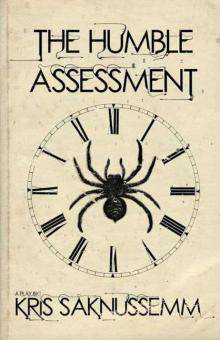 The Humble Assessment
The Humble Assessment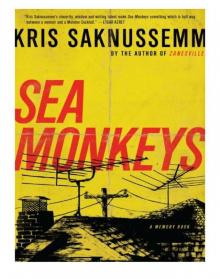 Sea Monkeys
Sea Monkeys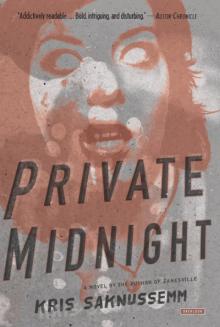 Private Midnight
Private Midnight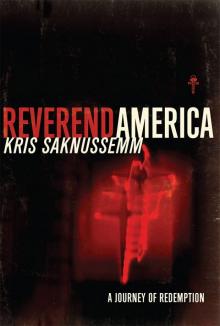 Reverend America: A Journey of Redemption
Reverend America: A Journey of Redemption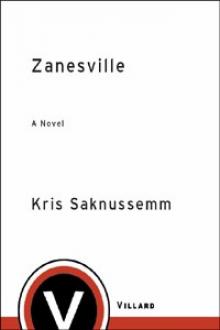 Zanesville: A Novel
Zanesville: A Novel